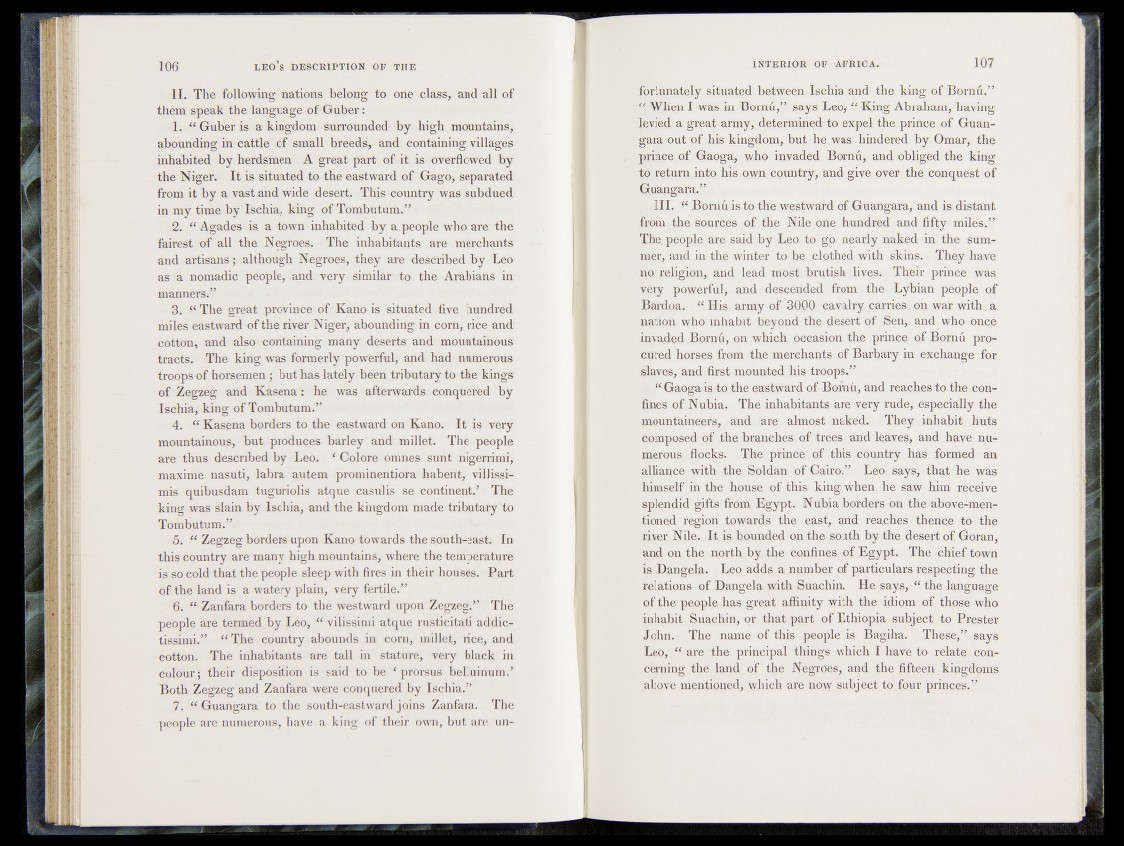
II. The following nations belong to one class, and all of
them speak the language of Gruber:
1. “ Guber is a kingdom surrounded by high mountains,
abounding in cattle of small breeds, and containing villages
inhabited by herdsmen A great part of it is overflowed by
the Niger. It is situated to the eastward of Gago, separated
from it by a vast and wide desert. This country was subdued
in my time by Ischia, king ofTombutmn.”
2. “ Agades is a town inhabited by a people who are the
fairest of all the Negroes. The inhabitants are merchants
and artisans ; although Negroes, they are described by Leo
as a nomadic people, and very similar to the Arabians in
manners.”
3» “ The great province of Kano is situated five hundred
mileseastward of the river Niger, abounding in corn, rice and
cotton, and also containing many deserts and mountainous
tracts. The king was formerly powerful, and had numerous
troops of horsemen; but has lately been tributary to the kings'
of Zegzeg and Kasena: he was afterwards conquered by
Ischia, king of Tombutum.”
4. “ Kasena borders to the eastward on Kano. I t is very
mountainous, but produces barley and millet. The people
are thus described-by Leo. * Coloreiomnes sunt nigerrimii
maxime nasuti, labra autem prominentiora habent, villissi-
mis quibusdam tuguriolis atque casulis se continent.’ The
king was slain by Ischia, and the kingdom made tributary to
Tombutum.”
5. 0 Zegzeg borders upon Kano towards the south-east. In
this country aremany high mountains, where the temperature
is so cold that the people sleep with fires in their houses. Part
of the land is a watery plain, very fertile.”
6. “ Zanfara borders to the westward upon Zegzeg.” The
people are termed by Leo, “ vilissimi atque rusticitati addic-
tissimi.” “ The country abounds in corn, millet, rice, and
cotton. The inhabitants are tall in stature, very black in
Colour; their disposition is said to be ‘ prorsus belluinum.’
Both Zegzeg and Zanfara were conquered by Ischia.”
7. “ Guangara to the south-eastward joins Zanfara. The
people are numerous, have a king of their own, but"are unfortunately
situated, between Ischia and the king of Bornó.”
“ -When I was in Bornü,” says Leo) “ King Abraham, having
levied a great army, determined to expel the prince of Guangara
out of his kingdom, but he was hindered, by Omar, the
prince of Gaoga, who invaded. Bornü, and obliged the king
to return into his,own country^and'give oyer the conquest óf
Guangara.”
III. “ Bomb, is to the westward of Guangara, and is distant
from the sources pi th# Nile one hundred and fifty miles.”
The people are said by Leo to- go nearly naked in the summer,
afidvin the winter to be clothed with skins. They have
nd* religion, anfl lead most brutish lives. Their prince was
yery powerful, and descended from the Lybian people of
Bardoa. “ His army of 3000 cavalry carries on war with a
nation who inhabit beyond the desert ofiSen, tod who once
invaded Bornü, on which occasion the prince óf Bornu procured
horses from the merchants of Barbary in exchange for
slaves, and first mounted his troops*”
v; “ Gaoga is to the eastward of Bornu, and reaches to the confines
of Nubia. The inhabitants are very rude, especially the
mountaineers, and are almost naked. They inhabit huts
composed of the branches of trees and leaves, and have numerous
flocks. The prince of this country has formed an
alliance with the Soldan of Cairo.” Leo says, that, he was
himself in the house of this king when he saw him receive
splendid gifts from Egypt. Nubia borders on the above-mentioned
region towards the east, and reaches thence to thé
river Nile. It is bounded on the south by the desert of Goran,
and on the north by the confines of Egypt. The chief town
is Dangela. Leo adds a number of particulars respecting the
relations * of Dangela with Suachin. He says, “ the language
of the people has great affinity with the idiom of those who
inhabit Suachin, or that part of Ethiopia subject to Prester
John. The name of this people is Bagiha. These,” says
Leo, “ are the principal things which T have to relate concerning
the land of the Negroes, and the fifteen kingdoms
above mentioned, which are now, subject to four princes.” .